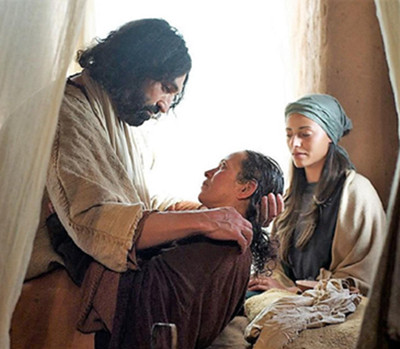5th Sunday in Ordinary Time - Longing for the Shade
Job is a character who raises for us the question of innocent suffering. His name has become synonymous with suffering. When his "comforters" come to give him all the stock answers - that he or perhaps his predecessors must have sinned - Job rejects their opinions. The passage we have today reminds us that we do suffer and that there is no satisfactory answer for this suffering. It seems, Job says, that life is a meaningless cycle of misery. But he is also expressing what we feel and what seems to be the human condition. He longs for a rest in the shade. He is voicing a complaint, or in biblical terms, a lament.
 Job's prayer is a Lamentation, a complaint of a faithful person to God. It is a prayer of great faith for it expresses belief in the One who is listening. It says that we are not alone as we cry out from the abyss, that our words do not fall on deaf ears. Job does not get a full answer from God, but he does learn that God is not deaf and hears the complaint of this pained and trusting servant who will not accept simple answers about suffering. He speaks boldly to God. His is a prayer of truth, a prayer of courage and a prayer of trust. For some of us this kind of prayer may be the only one that we can pray during times of suffering and helplessness.
Job's prayer is a Lamentation, a complaint of a faithful person to God. It is a prayer of great faith for it expresses belief in the One who is listening. It says that we are not alone as we cry out from the abyss, that our words do not fall on deaf ears. Job does not get a full answer from God, but he does learn that God is not deaf and hears the complaint of this pained and trusting servant who will not accept simple answers about suffering. He speaks boldly to God. His is a prayer of truth, a prayer of courage and a prayer of trust. For some of us this kind of prayer may be the only one that we can pray during times of suffering and helplessness.If we look at the Gospel of Mark, we see that the evangelist comes right to the point. Jesus was told about the woman's condition. He went over to her, "grasped her hand and helped her up and the fever left her. Jesus "helped her up." This is the same expression in the New Testament that is often used in the resurrection stories. Mark is implying that this person is being given a new life, a life that only the risen Jesus can give.
The phrase "helped her up" is better translated, "raised her up" and this links the cure to the real completion of the mystery of suffering. Mark tells us that she becomes a disciple and that the process of discipleship is first the healing encounter with Jesus that enables service in his name. We must recognize our responsibility to stop suffering as much as we can. Jesus is a sign of God's desire to deal with suffering. We do not deny the presence of suffering and the tragic in our lives. In fact, we do what we can to overcome it. But while Jesus deals with suffering and cures illnesses in these Gospel stories, he doesn't eliminate all pain from the world. Somehow we need to deal with that suffering and its causes as best we can. And then we are left with the awesome mystery of what remains.
That mystery rests in Jesus' proclamation that the "kingdom is at hand." The new life we so desperately seek is not so much to be found in the "next life" but firmly rooted in this life, given us so freely by God. And what does this new life look like? We are told when she was healed, the woman "began to wait on them." It may sound like she is just doing household chores, but the word Mark uses is "diakonia," the word for "service" or "ministry."
There is no easy answer to Job's problems. There is no "solution" to the mystery of suffering. We, too, long for a place in the shade. What shall we do in life when the world turns on us and suffering, pain and doubt mark our days? Shall we draw on our trust in God, as Job did? Shall we receive the hope and encouragement of the gospel that Jesus brings to us? We come to God with trust and place ourselves in the hands of God, anchored by the hope of new life that we have in Jesus Christ.
And this new life gives us the power to see the needs of others and to respond with trust and joy.